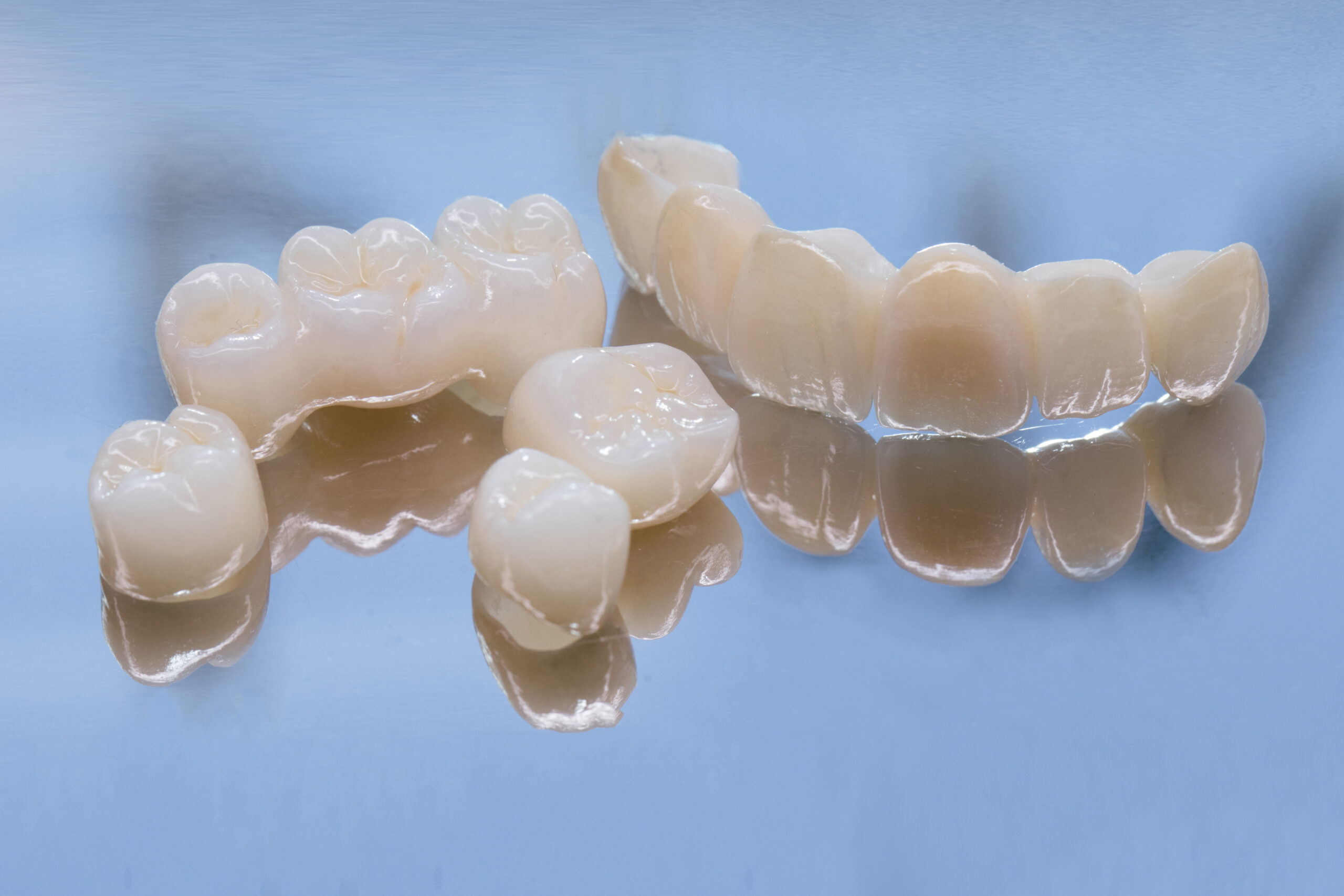Porcelain Crowns
These crowns provide a natural appearance, blending seamlessly with your existing teeth.

Experience the life-changing benefits of dental crowns and bridges at Figtree Dental. Located in the serene setting of Figtree, NSW, our practice is dedicated to providing exceptional dental care tailored to your unique needs. Whether you’re looking to restore a damaged tooth or fill in gaps from missing teeth, our experienced team is here to help you achieve your perfect smile.
Dental crowns and bridges are versatile solutions for various dental challenges, including the restoration of damaged teeth and the replacement of missing ones. A dental crown is a custom-made cap that covers a decayed or damaged tooth, restoring its strength, shape, and appearance while protecting it from further harm.
On the other hand, dental bridges are designed to replace one or more missing teeth. They consist of artificial teeth (pontics) supported by crowns on adjacent natural teeth, effectively restoring your smile’s aesthetics and preventing neighboring teeth from shifting out of place.
At Figtree Dental, we offer a comprehensive range of dental crown and bridge services tailored to your specific needs. Our skilled dental professionals will assess your oral health and recommend the most appropriate treatment plan to revitalize your smile. Our offerings include:
These crowns provide a natural appearance, blending seamlessly with your existing teeth.
Durable and aesthetically pleasing, ideal for front teeth.
Strong and resilient, suitable for both front and back teeth.
A permanent solution for replacing teeth, providing stability and functionality.
Choosing the right dental provider is essential for your oral health. Here’s why Figtree Dental is the perfect choice for your crown and bridge treatments:
Our team consists of skilled dentists with extensive training in restorative dentistry.
We take the time to understand your individual needs and tailor our treatments for optimal results.
Our clinic is equipped with the latest technology and equipment, ensuring high standards of care.
At Figtree Dental, we follow a structured process to ensure the success of your dental crown and bridge treatment. Our steps include:
During your first appointment, we will evaluate your oral health and discuss suitable treatment options.
We will create a personalized treatment plan based on your specific needs and preferences.
We will prepare the affected teeth by removing any decay or damage before placing the crown or bridge.
We will take impressions of your teeth to craft custom-fitted crowns or bridges that blend perfectly with your smile.
Once your crowns or bridges are ready, we will carefully attach them to the prepared teeth or implants.
To ensure optimal functionality and sustained oral health, we’ll schedule subsequent appointments to monitor the performance of your crowns and bridges.
Dental crowns are custom caps that protect damaged or decayed teeth, while bridges are prosthetic devices used to replace missing teeth by securing artificial ones to neighboring natural teeth or implants.
With proper care, dental crowns and bridges can last anywhere from 5 to 15 years or even longer.
The procedure is generally not painful due to local anesthesia. Some individuals may experience mild discomfort or sensitivity afterward, manageable with over-the-counter pain relief.
Costs can vary based on factors such as materials used and the complexity of the case, typically ranging from a few hundred to several thousand dollars per tooth.
Yes, you can usually resume your normal eating habits, but it’s advisable to avoid hard or sticky foods to protect your restorations.
Crowns and bridges repair damaged or missing teeth, whereas veneers are thin shells applied to the front of teeth for cosmetic improvement.
Materials include porcelain, ceramic, metal alloys, or a combination of these.
Yes, modern crowns and bridges are designed to closely mimic the natural color, shape, and texture of teeth, providing a lifelike appearance.
Care is similar to natural teeth: regular brushing, flossing, avoiding hard or sticky foods, and routine dental check-ups are essential.
Traditional whitening methods do not work on crowns and bridges. If discoloration occurs, replacement may be needed for restoration.
Coverage varies by policy and reason for treatment. It’s best to check with your insurance provider for specific details.
Yes, they can often be repaired depending on the damage’s severity. Your dentist will assess the situation and recommend the best solution.
While not permanent, they can last many years with proper care. They may need replacement over time due to wear and tear.
Crowns and bridges are designed to fit seamlessly and typically do not significantly affect speech, though a brief adjustment period may occur.
This depends on the severity of the gum disease and the damage to supporting structures. Your dentist will evaluate your oral health to determine the best approach.
Typically, at least two visits are necessary: one for preparation and impressions, and another for placing the final restorations.
Yes, crowns and bridges can be used to replace missing molars. Your dentist will recommend the best treatment for your situation.
Generally, crowns and bridges are not recommended for children unless there is significant tooth damage or congenital issues. In such cases, pediatric dentists may suggest appropriate options.
There is no difference; both terms refer to the same type of restoration.
No special maintenance is needed, but good oral hygiene practices like regular brushing and flossing are crucial for keeping them clean and healthy. Routine check-ups are also important.


